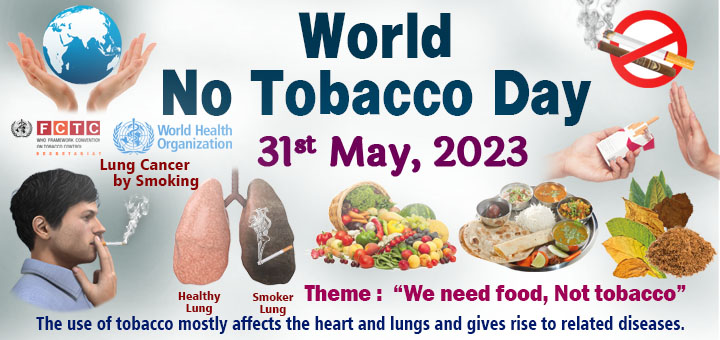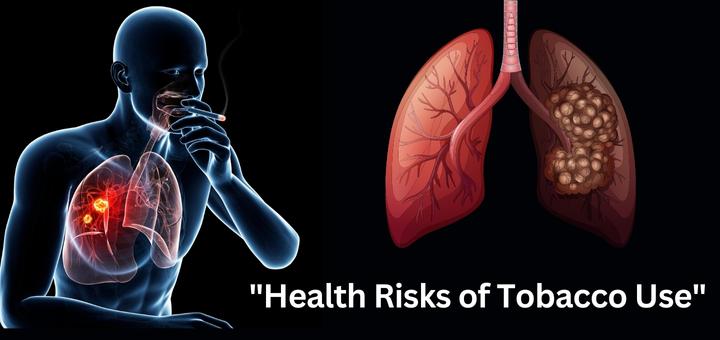31st May “World No Tobacco Day 2023”
‘We Need Food, Not Tobacco’ – Embracing the Raja Yogi Lifestyle to Overcome Addiction
World No Tobacco Day, observed on May 31st every year, serves as a global platform to raise awareness about the harmful effects of tobacco use and advocate for a tobacco-free world. The theme for World No Tobacco Day 2023 is “We Need Food, Not Tobacco,” highlighting the importance of sustainable food production and the detrimental impact of tobacco cultivation on both food security and individual well-being. This article explores the significance of prioritizing food over tobacco and how adopting a Raja Yogi lifestyle can help individuals overcome tobacco addiction.

The Harmful Effects of Tobacco:
Tobacco use is one of the leading causes of preventable deaths worldwide. It is responsible for over 8 million deaths every year, with a majority of them occurring in low- and middle-income countries. Tobacco use is associated with a range of health risks, including lung cancer, heart disease, stroke, chronic obstructive pulmonary disease (COPD), and various other types of cancer. It also increases the risk of developing respiratory infections and can harm the health of non-smokers through secondhand smoke exposure.
• Every cigarette you smoke cuts your life expectancy by 11 minutes.
• Just one pack of cigarettes reduces your lifespan by 3 and a half hours.
• Tragically, individuals who succumb to tobacco-related illnesses lose an average of 14 years of their lives.

How to Quit Smoking
Quitting smoking can be challenging, but it is the most important step toward a healthier life. There are various methods and resources available to help individuals quit smoking including nicotine replacement therapy, medications, counseling, Raja yogi lifestyle, and support groups. It is essential to seek professional help and support from family and friends to increase the chances of successfully quitting tobacco.
Quitting smoking is not easy, but it is worth it. If you are struggling to quit smoking, please reach out for help. Our Brahma Kumaris Centers are located all over the world. You can find a list of centers on our website.

The Raja Yogi Lifestyle:
The Raja Yogi lifestyle, rooted in ancient Indian traditions, offers a holistic approach to combating tobacco addiction. It combines spiritual practices, meditation, and healthy living habits to support individuals on their journey to wellness.
Meditation:
Raja Yoga promotes meditation as an effective tool to reduce stress, enhance mental clarity, and increase self-awareness. By practicing meditation regularly, individuals can gain control over their thoughts and emotions, reducing their dependence on tobacco as a coping mechanism.

Healthy Living Habits:
The Raja Yogi lifestyle emphasizes the importance of maintaining physical health through regular exercise, balanced nutrition, and adequate rest. Engaging in physical activities not only helps individuals divert their focus from tobacco but also improves overall well-being.
Spiritual Strength:
Raja Yoga meditation fosters spiritual growth and inner strength, empowering individuals to overcome addictions. By connecting with their inner selves, individuals can find purpose and fulfillment, diminishing the desire for harmful substances like tobacco.
Benefits of Alternative Crops:

Growing sustainable, nutritious crops can have numerous benefits for farmers and their communities. Unlike tobacco, which is a monoculture crop that depletes soil nutrients and requires large amounts of water and pesticides, alternative crops can improve soil health, conserve water, and reduce the need for harmful chemicals. They can also provide a source of nutritious food for local communities and support the local economy by creating jobs and promoting food security.

Marketing Opportunities:
One of the biggest challenges for tobacco farmers is finding alternative sources of income. The transition to alternative crops can be difficult without support and guidance. However, there are numerous organizations and programs that provide training and marketing opportunities for farmers to promote sustainable agriculture and alternative crop production. By supporting these initiatives, we can help tobacco farmers transition to more sustainable and profitable crops.

Health and Environmental Impacts:
Tobacco farming and tobacco use have numerous health and environmental impacts. Tobacco use is a leading cause of preventable death worldwide, causing millions of deaths each year. The tobacco industry is responsible for the deforestation of millions of hectares of land each year. Tobacco cultivation also uses a significant amount of water, which could be used to grow food instead. Tobacco farming also contributes to soil degradation and water pollution. By shifting away from tobacco farming and promoting sustainable agriculture, we can improve our health and the health of our environment.
Economic Benefits:
Supporting sustainable agriculture and alternative crop production can also have economic benefits. Alternative crops can provide a more stable source of income for farmers and create new job opportunities in the agriculture sector. They can also promote local economic development by promoting food security and reducing the need for expensive imports.

Conclusion:
World No Tobacco Day 2023 is a great opportunity to overcome tobacco addiction by adopting the Raja yogi lifestyle and promoting alternative crop production and marketing opportunities for tobacco farmers. By supporting sustainable agriculture and promoting nutritious food, we can improve our health, environment, and economy. Whether you’re a farmer, consumer, or policy maker, we all have a role to play in promoting sustainable agriculture and creating a healthier, more equitable world. Let’s work together to shift away from tobacco farming and embrace a future that prioritizes food over tobacco.
Statistics on tobacco-related deaths in India and the world in 2023:
India
- Total Deaths: It is estimated that tobacco-related illnesses cause more than 1.4 million deaths in India each year.
- Smoking-Related Deaths: The number of deaths caused by smoking tobacco is estimated to be around 1 million per year in India.
- Secondhand Smoke-Related Deaths: Secondhand smoke, which is the smoke exhaled by smokers and the smoke emitted from burning tobacco products, also contributes to deaths. It is estimated that around 38,000 deaths occur annually due to exposure to secondhand smoke.
- Diseases Caused by Tobacco: Tobacco consumption is linked to various diseases, including but not limited to cancer, cardiovascular diseases, respiratory diseases, and diabetes. It is estimated that about 50% of all cancers in men and 25% of all cancers in women in India are tobacco-related.
- Economic Burden: Apart from the health consequences, tobacco-related diseases impose a significant economic burden on individuals, families, and the healthcare system. The costs of healthcare lost productivity, and premature deaths associated with tobacco use are substantial.
World
- Total Deaths: It is estimated that tobacco-related illnesses cause more than 8.7 million deaths in the world each year.
- Smoking-Related Deaths: The number of deaths caused by smoking tobacco is estimated to be around 7.7 million per year in the world.
- Secondhand Smoke-Related Deaths: Secondhand smoke, which is the smoke exhaled by smokers and the smoke emitted from burning tobacco products, also contributes to deaths. It is estimated that around 1.3 million deaths occur annually due to exposure to secondhand smoke.
- Diseases Caused by Tobacco: Tobacco consumption is linked to various diseases, including but not limited to cancer, cardiovascular diseases, respiratory diseases, and diabetes. It is estimated that about 22% of all cancer deaths, 13% of all cardiovascular disease deaths, and 7% of all respiratory disease deaths are tobacco-related.
- Economic Burden: Apart from the health consequences, tobacco-related diseases impose a significant economic burden on individuals, families, and the healthcare system. The costs of healthcare lost productivity, and premature deaths associated with tobacco use are substantial.
The number of tobacco-related deaths in the world is expected to continue to rise in the coming years unless there are significant efforts to reduce tobacco use. The World Health Organization (WHO) has set a target of reducing tobacco use by 30% by 2030. To achieve this target, WHO is calling on governments to implement a comprehensive set of tobacco control measures, including:





Recent Comments